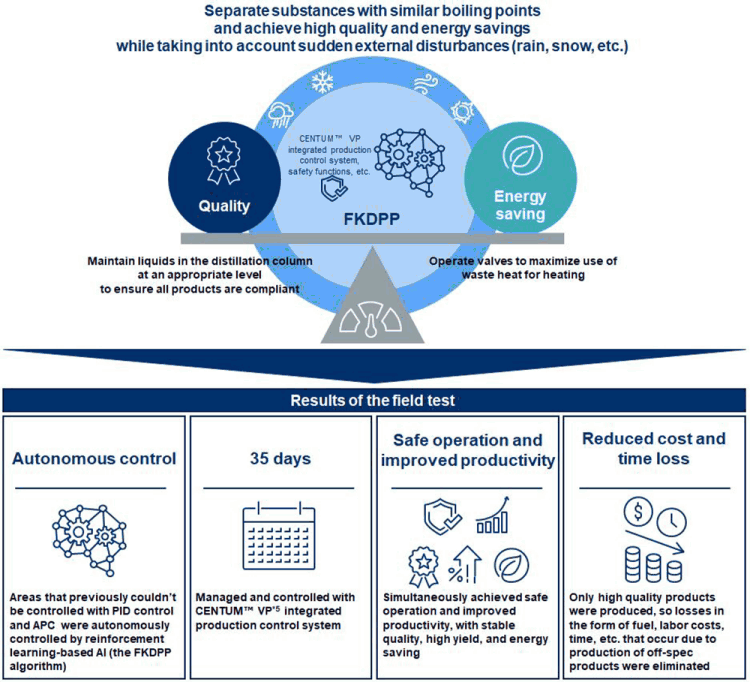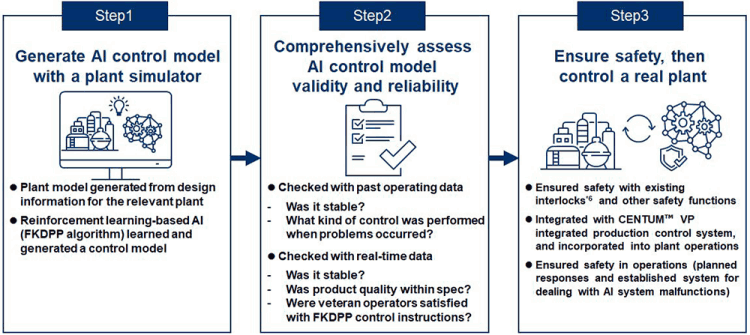
A successful field test was recently concluded in which AI (artificial intelligence) was used to autonomously run a chemical plant for 35 days – a world first. The cooperative effort between Yokogawa Electric and JSR (a Japanese synthetic rubber manufacturing company) both confirmed that reinforcement-learning AI can be safely applied in an actual plant, and demonstrated that this technology can control operations that have been beyond the capabilities of existing control methods and which have, up to now, necessitated the manual operation of control valves based on the judgements of plant personnel. The initiative was selected for the 2020 ‘Projects for the Promotion of Advanced Industrial Safety’ subsidy programme of the Japanese Ministry of Economy, Trade and Industry.
Process control implementation through AI
Control in the process industries spans a broad range of fields, from oil refining and petrochemicals to high-performance chemicals, fibre, steel, pharmaceuticals, foodstuffs and water. All these entail chemical reactions and other systems that require an extremely high level of reliability.
In this field test, the AI solution successfully dealt with the complex conditions needed to ensure product quality and maintain liquids in the distillation column at an appropriate level, while making maximum possible use of waste heat as a heat source. In so doing, it stabilised quality, achieved high yield, and saved energy. Figure 1 shows the areas that were controlled, and the results thereof.

While rain, snow and other weather conditions were significant factors that could disrupt the control state by causing sudden changes in the atmospheric temperature, the products that were produced met rigorous standards and have since been shipped. Furthermore, as only good-quality products were created, fuel, labour, time, and other losses that occur when off-spec products are produced, were all eliminated.
The AI used in this control experiment, the Factorial Kernel Dynamic Policy Programming (FKDPP) protocol, was jointly developed by Yokogawa and the Nara Institute of Science and Technology (NAIST) in 2018. It was recognised at an IEEE International Conference on Automation Science and Engineering as being the first reinforcement learning-based AI in the world that can be utilised in plant management.
Through initiatives including the successful implementation of a control training system experiment in 2019, and an experiment in April 2020 that used a simulator to recreate an entire plant, Yokogawa has confirmed the potential of this autonomous control AI and advanced it from a theory to a technology suitable for practical use. It can be used in areas where automation was previously not possible with conventional control methods (PID control and APC, i.e., advanced process control), and its strengths include being able to deal with conflicting targets, such as the need for both high quality and energy savings.
Given the numerous, complex physical and chemical phenomena that impact operations in actual plants, there are still many situations where veteran operators must step in and exercise control. Even when operations are automated using PID control and APC, highly experienced operators must halt automated control and change configuration and output values when, for example, a sudden change occurs in atmospheric temperature due to rainfall or some other weather event. This is a common issue at many companies’ plants.
Regarding the transition to industrial autonomy, a very significant challenge has been not only instituting autonomous control in situations where manual intervention has been essential, but also doing so with as little effort as possible while simutaneously ensuring a high level of safety. The results of this test suggest that this collaboration between Yokogawa and JSR has opened a path forward in resolving this longstanding issue. Safe operations were ensured through the steps illustrated in Figure 2.

Yokogawa welcomes customers who are interested in these initiatives globally, and aims to swiftly provide products and solutions that lead to the realisation of industrial autonomy. JSR believes that this demonstration shows AI’s potential for addressing challenges that could previously not be resolved at chemical plants, and will investigate its application to other processes and plants with the aim of achieving further improvements in productivity. Going forward, the two companies will continue to work together and investigate ways of using AI in plants.
Masataka Masutani, general manager of production technology at JSR, commented: “In an environment that is changing due to factors such as the fully-fledged introduction of 5G and other developments towards a digital society, as well as the ageing of the human resources who ensure plant safety – and a lack of human resources to replace them – the petrochemical industry is under strong pressure to improve safety and efficiency in its production activities by utilising new technologies such as IoT and AI.
“We verified that AI can autonomously control the processes that were previously performed manually on the basis of operators’ experience, and we are firmly convinced of the usefulness and future potential of AI control. From those in the field, we have heard comments saying that not only has the burden on operators been reduced, but the very fact that we have taken on the challenge of this new technology, and succeeded, is motivation for taking digital transformation forward into the future. Henceforth, we shall expand operations controlled with AI, and work to enhance chemical plant safety, stability, and competitiveness.”
Takamitsu Matsubara, associate professor at NAIST, remarked that he was very glad to hear that this field test was successful. “Data analysis and machine learning are now being applied to chemical plant operations, but technology that can be used in autonomous control and the optimisation of operations has not been fully ready until now.
“The reinforcement learning AI FKDPP algorithm was jointly developed by Yokogawa and NAIST in 2018 to realise autonomous control in chemical plants. Despite having to refer to a large number of sensors and control valves, the AI can generate a robust control policy in a limited number of learning trials. These features helped to improve the efficiency of the development process and led to the achievement of autonomous control for a long period of 840 hours during the field test.
“I think this very difficult achievement of autonomous control in an actual distillation column, and the fact that the level of practical application has been raised to the point where the entire production process and safety are integrated into one system, have great significance for the entire industry. I look forward to seeing what happens next with this technology,” he said.
Yokogawa Electric’s vice president and head of Yokogawa Products Headquarters, Kenji Hasegawa, added: “With our gaze fixed firmly on a world of autonomous operation that forms the model for the future of industries, we are now promoting the concept of IA2IA – Industrial Automation to Industrial Autonomy. To achieve strong and flexible production that takes into consideration the impact of differences in humans, machines, materials and methods in the energy, materials, pharmaceuticals and many other industries, we will accelerate the joint development of autonomous control AI with our customers around the world.”
| Tel: | +27 11 831 6300 |
| Email: | [email protected] |
| www: | www.yokogawa.com/za |
| Articles: | More information and articles about Yokogawa South Africa |
© Technews Publishing (Pty) Ltd | All Rights Reserved